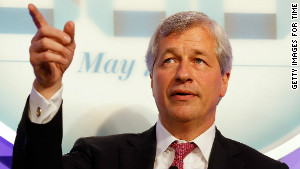
- JP Morgan Chase lost $2 billion in hedge fund trading
- CEO Jamie Dimon has been leading opponent of today's tighter regulations
- His fight to loosen regulations has been damaged, Candy Crowley observes
Washington (CNN) -- JPMorgan Chase announced last week that it lost $2 billion as the result of some complicated hedge fund trading, which according to its top executive is apparently not as bad as it sounds.
"This is a stupid thing we should never have done, but we are still going to earn a lot of money this quarter. It's not like this company is jeopardized -- we hurt ourselves and our credibility, yes, and we've got to fully expect that and pay the price for that," CEO Jamie Dimon said on NBC's "Meet the Press" on Sunday.
Explain it to me: How did JPMorgan lose that much money?
To be perfectly clear, JPMorgan did not lose taxpayer money. It lost its own money. Still, the news shook up Wall Street and Capitol Hill with bad flashbacks.
"Well, this is a big surprise because this particular bank is well-respected. It is well-led. And so, to have this kind of a loss from hedging activities is a big surprise," Sen. Dianne Feinstein, D-California, said on "Fox News Sunday." "I think what it points out that there are no rules of the road for hedging and for derivatives. And this needs to happen."
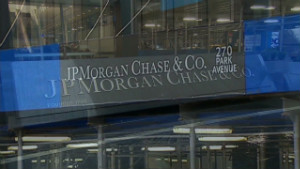
 Capitol Hill reacts to JPMorgan's loss
Capitol Hill reacts to JPMorgan's loss 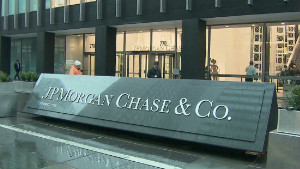
 JPMorgan's $2 billion loss, missteps
JPMorgan's $2 billion loss, missteps 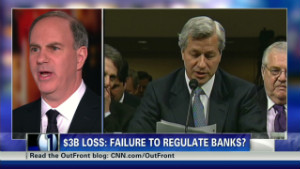
 What should happen to JPMorgan's CEO?
What should happen to JPMorgan's CEO? 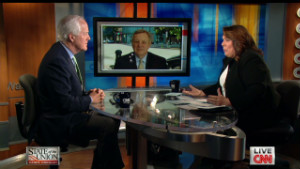
 Getting things done in Washington
Getting things done in Washington After the meltdown three years ago that nearly took the country over a cliff, Congress passed Dodd-Frank, a regulatory law to rein in risky investments and prevent the need for future government bailouts.
Writing the regulations has been a ferocious battle, particularly over something called the Volcker Rule, after former Fed Chairman Paul Volcker. It would ban banks from trading with their own funds.
Worried about damaging the industry's ability to protect itself and hurting the recovery, the Treasury Department, Republicans and Wall Street have been trying to water it down.
Dimon, a kind of a shining light in the industry, is a leading opponent of the Volcker Rule. Or has been until maybe now.
Sen. Carl Levin, D-Michigan, told "Meet the Press" that the price to be paid "will be that they will lose their battle in Washington to weaken the rule. That is the real price."
If Dimon has lost his voice, Republicans have not.
"Bear in mind, the Dodd-Frank bill, 2,300 pages, they've already had 400 rule-making sessions, and this is where you have so much government regulation coming in that you can't see the forest for the trees," Rep. Marsha Blackburn, R-Tennessee, said on ABC's "This Week."
It is, as talking head after talking head conceded, very complicated.
But not all of it.
"In how we manage that portfolio, we did lose $2 billion trading. In hindsight, we took far too much risk," Dimon said. "The strategy we had was barely vetted. It was barely monitored. It should never have happened."
Unfortunately, the part that is clear is not reassuring.
Watch State of the Union with Candy Crowley Sundays at 9am ET. For the latest from State of the Union click here.
No comments:
Post a Comment